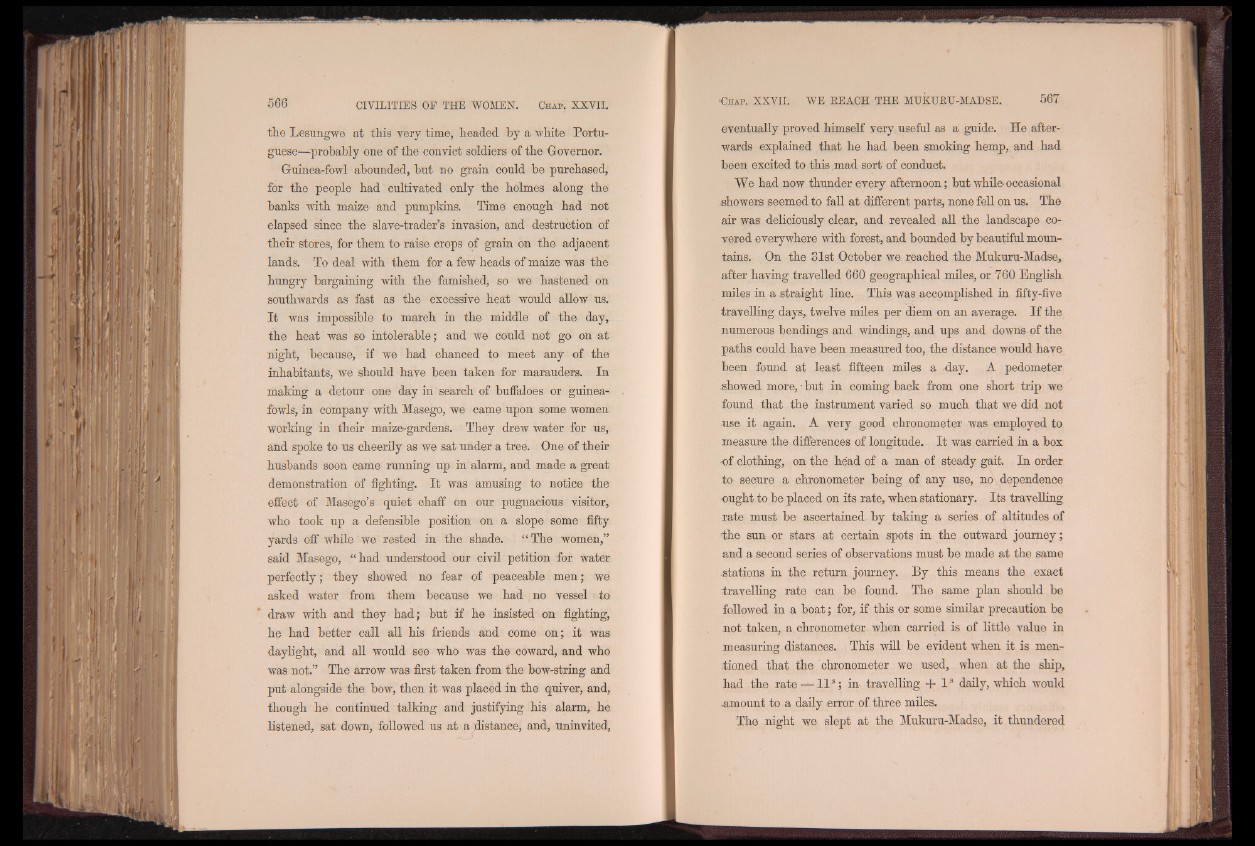
the Lesungwe at this very time, headed by a white Portuguese—
probably one of the convict soldiers of the Governor.
Guinea-fowl abounded, but no grain could be purchased,
for the people had cultivated only the holmes along the
banks with maize and pumpkins. Time enough had not
elapsed since the slave-trader’s invasion, and destruction of
their stores, for them to raise crops of grain on the adjacent
lands. To deal with them for a few heads of maize was the
hungry bargaining with the famished, so we hastened on
southwards as fast as the excessive heat would allow us.
I t was impossible to march in the middle of the day,
the heat was so intolerable; and we could not go on at
night, because, if we had chanced to meet any of the
inhabitants, we should have been taken for marauders. In
making a detour one day in search of buffaloes or guinea-
fowls, in company with Masego, we came upon some women
working in their maize-gardens. They drew water for us,
and spoke to us cheerily as we sat under a tree. One of their
husbands soon came running up in alarm, and made a great
demonstration of fighting. I t was amusing to notice the
effect of Masego’s quiet chaff on our pugnacious visitor,
who took up a defensible position on a slope some fifty
yards off while we rested in the shade. “ The women,”
said Masego, “ had understood our civil petition for water
perfectly; they showed no fear of peaceable men; we
asked water from them because we had no vessel > to
draw with and they had; but if he insisted on fighting,
he had better call all his friends and come on; it was
daylight, and all would see who was the coward, and who
was not.” The arrow was first taken from the bow-string and
put alongside the bow, then it was placed in the quiver, and,
though he continued talking and justifying his alarm, he
listened, sat down, followed us at a distance, and, uninvited,
eventually proved himself very useful as a guide. He afterwards
explained that he had been smoking hemp, and had
been excited to this mad sort of conduct.
We had now thunder every afternoon; but while occasional
showers seemed to fall at different parts, none fell on us. The
air was deliciously clear, and revealed all the landscape covered
everywhere with forest, and bounded by beautiful mountains.
On the 31st October we reached the Mukuru-Madse,
after having travelled 660 geographical miles, or 760 English
miles in a straight line. This was accomplished in fifty-five
travelling days, twelve miles per diem on an average. If the
numerous bendings and windings, and ups and downs of the
paths could have been measured too, the distance would have
been found at least fifteen miles a day. A pedometer
showed more, • but in coming back from one short trip we
found that the instrument varied so much that we did not
use it again. A very good chronometer was employed to
measure the differences of longitude. I t was carried in a box
•of clothing, on the head of a man of steady gait. In order
to secure a chronometer being of any use, no dependence
ought to be placed on its rate, when stationary. Its travelling
rate must be ascertained by taking a series of altitudes of
the sun or stars at certain spots in the outward journey;
and a second series of observations must be made at the same
-stations in the return journey. By this means the exact
travelling rate can be found. The same plan should be
followed in a boat; for, if this or some similar precaution be
not taken, a chronometer when carried is of little value in
measuring distances. This will be evident when it is mentioned
that the chronometer we used, when at the ship,
had the rate -—11s; in. travelling + 1 8 daily, which would
.amount to a daily error of three miles.
The night we slept at the Mukuru-Madse, it thundered